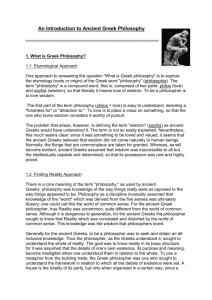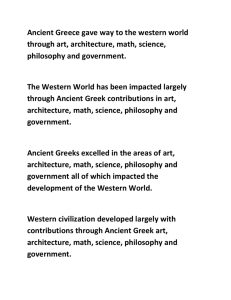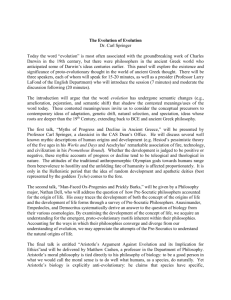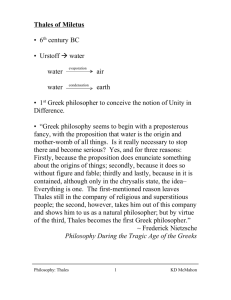Introduction to Greek Philosophy
advertisement
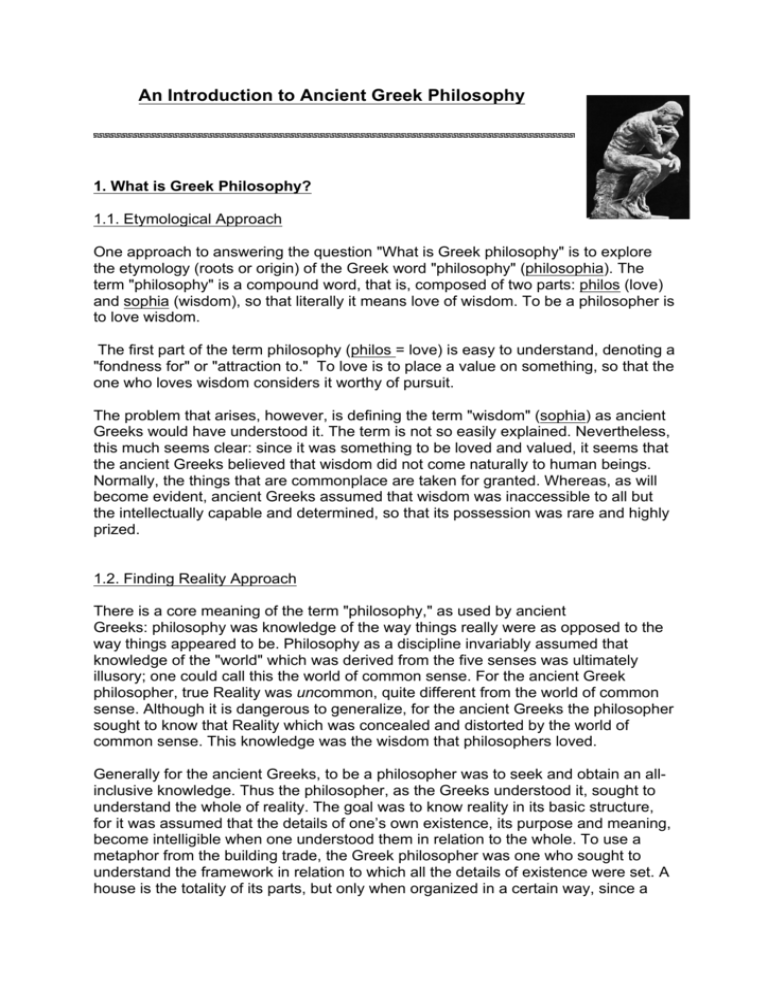
An Introduction to Ancient Greek Philosophy 1. What is Greek Philosophy? 1.1. Etymological Approach One approach to answering the question "What is Greek philosophy" is to explore the etymology (roots or origin) of the Greek word "philosophy" (philosophia). The term "philosophy" is a compound word, that is, composed of two parts: philos (love) and sophia (wisdom), so that literally it means love of wisdom. To be a philosopher is to love wisdom. The first part of the term philosophy (philos = love) is easy to understand, denoting a "fondness for" or "attraction to." To love is to place a value on something, so that the one who loves wisdom considers it worthy of pursuit. The problem that arises, however, is defining the term "wisdom" (sophia) as ancient Greeks would have understood it. The term is not so easily explained. Nevertheless, this much seems clear: since it was something to be loved and valued, it seems that the ancient Greeks believed that wisdom did not come naturally to human beings. Normally, the things that are commonplace are taken for granted. Whereas, as will become evident, ancient Greeks assumed that wisdom was inaccessible to all but the intellectually capable and determined, so that its possession was rare and highly prized. 1.2. Finding Reality Approach There is a core meaning of the term "philosophy," as used by ancient Greeks: philosophy was knowledge of the way things really were as opposed to the way things appeared to be. Philosophy as a discipline invariably assumed that knowledge of the "world" which was derived from the five senses was ultimately illusory; one could call this the world of common sense. For the ancient Greek philosopher, true Reality was uncommon, quite different from the world of common sense. Although it is dangerous to generalize, for the ancient Greeks the philosopher sought to know that Reality which was concealed and distorted by the world of common sense. This knowledge was the wisdom that philosophers loved. Generally for the ancient Greeks, to be a philosopher was to seek and obtain an allinclusive knowledge. Thus the philosopher, as the Greeks understood it, sought to understand the whole of reality. The goal was to know reality in its basic structure, for it was assumed that the details of one’s own existence, its purpose and meaning, become intelligible when one understood them in relation to the whole. To use a metaphor from the building trade, the Greek philosopher was one who sought to understand the framework in relation to which all the details of existence were set. A house is the totality of its parts, but only when organized in a certain way, since a pile of building materials is not a house. It is the framer who gives the house its basic shape or structure; all the details of a house are set in relation to the framework. By analogy, for the ancient Greeks, philosophy was the attempt at understanding the framework of Being, the basic "shape or structure" of reality, in relation to which all the details of existence were set. It is important to note that for the ancient Greeks, philosophy as knowledge of Reality or Being affected how a person lived; in other words, philosophy had ethical implications. What a philosopher knew was not merely theoretical knowledge, unrelated to the other aspects of human existence. The ancient Greeks assumed that one ought to live one’s life in conformity to the way things really were; otherwise, one could not be happy, not to mention that fact that one would be a hypocrite. But again, how one ought to live was thought to be concealed from human beings, not being self-evident; what appeared to be a means of happiness usually was not. Only the philosopher knew how to live, because ethics has its origin in knowledge of Reality or Being: to know the Whole is to know one’s place in relation to the Whole. Is it true that there is some fundamental reality that exists separately from what our senses show us? 2. Possibility of Philosophy Ancient Greek philosophy generally distinguished human beings from other sentient beings by asserting that that the former had the capacity to philosophize; often they explained this by postulating that human beings possessed reason (logos), or some such expression. What they seem to have meant by this is explained by Bernard Lonergan, who is a modern philosopher standing within the Aristotelian tradition (Aristotle was, of course, an ancient Greek philosopher). According to Lonergan, what the Greek philosophers meant when they said that human beings possessed reason (or some similar expression) was that what distinguished a human being from another sentient being was the capacity for self-transcendence. What does this mean? Well, transcendence denotes the state of having gone beyond. Thus, self-transcendence is the state of having gone beyond oneself. One does this whenever one goes beyond the world of pure, practical self-interest and seeks to know something for its own sake. Human beings have, according to Lonergan, the pure, unrestricted desire to know; this is a distinctively human. This pure, unrestricted desire to know drives us beyond ourselves in an effort to understand reality for its own sake. When all of our physical needs have been met, we do not curl up and go to sleep, as a dog does; instead we begin to ask questions. This is our uniqueness: the capacity and drive to ask questions about everything. This is why Lonergan writes, "Man is an animal for whom mere animality is indecent" (Insight, 187). According to Lonergan, the unrestricted desire to know will eventually lead one to ask the question about Being, so that all human beings are (potentially at least) philosophers. The possibility of self-transcendence also means that human beings are capable of examining courses of action and choosing the one which is logically demanded by reality, often called the good. Thus, the human being is intrinsically an ethical being. Is it true that all human beings are philosophers whether they want to be or not? 3. Possibility that Philosophy is ‘Impossibility’ There was a subversive undercurrent in Greek intellectual culture, standing in opposition to the basic assumption shared by all philosophers in spite of their diversity. These anti-philosophers viewed the goal of philosophy as unattainable. Either there is no Reality to know behind the world of common sense or, if there is such a Reality, it is inaccessible to human beings. The Sophists fall into the first class of anti-philosopher, while the Skeptics fall into the second class. Given all the different versions of Reality or Being that were produced by Greek philosophy (and those produced by philosophers from different cultures and eras), it seems that the Sophists and the Skeptics may be correct in their criticisms of philosophy. If philosophy were possible, one would expect after so many centuries of philosophical activity that there would be consensus; there is none, however, so far……… How do you account for philosophical diversity? The Pre-Socratics The roots of Western philosophy (as opposed to Eastern, i.e., Indian and Chinese) are to be found in the pre-Socratic philosophers, beginning in the sixth century BCE. These philosophers lived, as the term implies, before Socrates, so that they obviously did not consider themselves as pre-Socratics; this is a term that was imposed upon them by later generations. The fact that they are called "preSocratics" implies that ancient Greek philosophy should be organized around Socrates and Plato. This implies that all pre-Socratic philosophers were preliminary to or preparatory of Socrates and Plato. That this is true is, however, a presupposition that should not necessarily be accepted as fact. Most of the so-called pre-Socratics came from the eastern or western parts of the Greek world; Athens would only later enter the philosophical fray.



